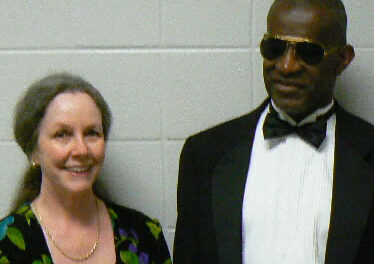Civil Rights through Song: A Choral History of Raleigh through the Civil Rights Era is not a part of Burning Coal Theatre Company‘s regular season but is a special project for innovative theater funded in part by a CORAC (City of Raleigh Arts Commission) collaboration grant. It draws on the talents of the Burning Coal Theatre Company and the Raleigh Boychoir to celebrate the civil rights movement from the segregated early-1950s to today.
The dramatic material was put together by Ian Finley. The director is Ilana Rozin. Jerome Davis, Artistic Director of Burning Coal Theatre Company, serves as Artistic Director of this production. Robin Harris provides choreography and Robert Unger, Artistic Director of The Raleigh Boychoir, is the Choral Conductor..
It must be said that there was plenty of evidence of inadequate rehearsal time and lack of planning for this opening night performance. To begin with, the printed programs for the production had not yet arrived. There were several awkward moments of timing when performers did not seem confident about delivering their lines – to wait for the singing to stop or to speak over the music. The singing was spotty; sometimes very nice, but often characterized by uncertainty. I found myself wishing the director had had more time for details like training the young singers to smile more. The few smiles I did see were captivatingly charming. Nothing sells a show like smiling, confident and positive young singers especially in a production like this. These things will improve as the production matures and, in spite of them, this is a worthy effort that does a fine job of addressing what remains as a delicate topic and an unfinished work in process.
The “story” is introduced by a number of actors portraying Raleigh residents who describe a divided and discordant community and promise that it will move toward unity and harmony. The white choir sings songs like “That’s All Right,” and “Blue Suede Shoes.” Acted vignettes describe southern hospitality and define the dividing lines of Fayetteville Street and Hargett Street in the Raleigh of the 1950s.
We are introduced to a young girl (black) and a young boy (white), their natural attraction to each other, and the barriers inflicted by parental prejudices. The white choir sings “In the Garden,” and “How Great Thou Art.” The Raleigh citizens remind us of the divided world we lived in and the turmoil with which we responded to the 1954 Supreme Court case Brown v. Board of Education.
Raleigh deals with the changes in 1956-57 and the all-white choir sings “Amazing Grace,” but is gradually replaced by the all-black choir’s rendition of “We Shall Overcome.” We are reminded of the cases of students from segregated schools applying to schools where they would have a better opportunity for learning and being delayed and denied by school board maneuvering. The divide between the young girl and the young boy becomes more pronounced. It is interesting how the white mother conveys a very definite attitude without saying anything hurtful at all.
There is a touching scene where the young girl wants to participate in a sit-in and her father expresses trepidation, but conveys understanding and support.
The black choir sings “Go Down, Moses,” and “Wade in the Water.” There is reference to movie theaters and restaurants being gradually integrated in the 1960s.The black choir sings “He’s Got the Whole World in His Hands.”
It becomes more and more apparent that it is the young people who are going to find some grace in the fruition of the civil rights movement. The Raleigh Boychoir, supplemented by some girls of the same age, racially diverse, sing and dance lovely performances of John Lennon’s magical “Imagine” and Woody Guthrie’s “This Land Was Made for You and Me,” The black and the white choirs join the youth choir and all sing a strong version of “Let There Be Peace on Earth,” during which music folders are passed surreptitiously among the singers. The show ends with the singing of a song that was unknown to me; I learned later it was written by a Canadian of African descent. Perhaps it was the intention to illustrate the unknown future of the unfinished business of the civil rights and equal justice movement.
As a celebration of the work and accomplishments of the past 60 years, Civil Rights through Song, is a worthy achievement; sensitively done and concurrently providing a rewarding evening of entertainment. I found myself singing along with many songs and remembering where I had been, back then, and what I had done. It was a bonus that some of the critical events of the era actually took place in the historic Murphy School, which now serves as Burning Coal’s performance venue.
Several actors’ performances stood out, especially the strong black woman narrator who introduced and ended the show and delivered particularly inspiring words near the end. The young black girl and her father and the young white boy and his mother provided a sense of development through the piece and were well played. The Raleigh citizens in their various guises were accomplished and effective.
This production continues through March 23. For details, see the sidebar.












